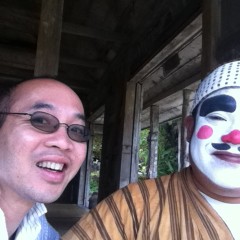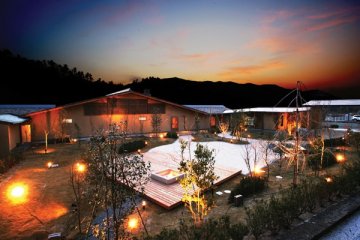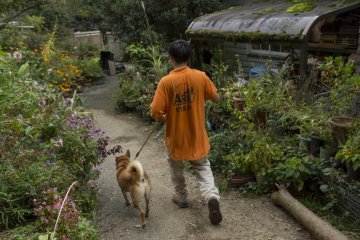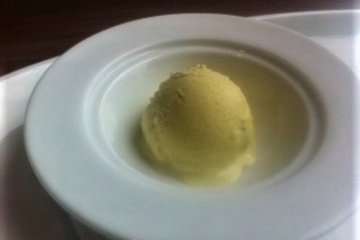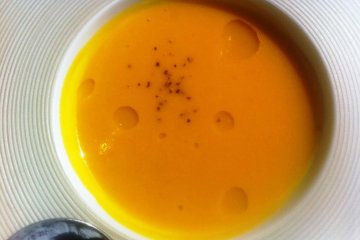In recent years the farm to table or paddock to plate movement has taken root in many countries, where people like to connect with the farmers who supply the food to our tables.
At the Keburikawa Hot Spring Resort restaurant in the mountains behind Kameoka, they take the concept one step further by owning both a farm and the restaurant. Long before I arrived at the resort, I was already relaxed. The dramatic mountain views on the way up from Kyoto; along the stunning forests and river-scapes along the spectacular Hozugawa gorge was exactly what I needed after a hard week.
There are two restaurants in the resort. One is buffet style, the other specializing in set menus, one that would not be out of place in a Michelin star or 2 hatted restaurant. While it may not win awards for innovation, its simple, yet lightly seasoned cuisine balances the innate desire for comfortable food and the joy of discovering something new.
By all means try the set menu, set in an airy and beautiful cathedral like setting. The high wood beam ceilings and the pleasant lawn outside is a great way to prepare you for a wonderful meal, best of all being a hidden secret that even most Kyoto-ites have not heard of.
There is a selection of various set menus for our Saturday lunch, starting from 2,500 yen. We chose the 2,500 yen western style lunch set, thinking that would give us some time to hop into the hot spring bath after lunch. There is also a 3,500 yen Japanese menu.
We start with some Appetizers & Hor'douves, aptly named treasures from the mountains and the sea. The cold tomato soup was a tangy pick me up, which complemented the smoked salmon topped with an onion and red peppers/capsicum relish, made even more tasty from the fact the vegetables were freshly picked from their own farm.
This was followed by the resort’s own garden vegetable soup, made from butternut pumpkin and blended with a touch of olive oil; it is rich in taste yet light and easy to drink. The pumpkin almost had a roast bakery aroma, a perfect way to celebrate an autumn harvest. This is another great example of the balance between comfort and style.
It is then the ocean’s turn to impress, with a fillet of wild sea bass which was crispy on the outside and tasty on the inside, not at all dry or bland, served with garlic infused risotto with two varieties of mushrooms picked at the peak of the season. It was another amazing dish.
Japanese cuisine makes an appearance with the Udon noodles, served with ginger shreds and a sweet light soy dipping sauce, all served on separate handmade bowls with an earthy texture, like sculptures of the surrounding countryside. When you drop the ginger shreds in the soba dipping sauce, it bursts open, like dandelions in the breeze. The udon is firm and like bread, it prepares your palate for something more flavorsome.
Main course was beef fillets from the nearby Tanba district, served with “torotoro”, or Okura like eggplant. Its texture is likened to a mélange of steamed asparagus and carrot. Accompanying the beef was a selection of dips: the pink Andes salt is said to be good for your complexion, while the white Miyajima salt from Okinawa accentuates the grilled beef taste. The ponzu and diced daikon relish on the other hand has a citrus taste and almost a sorbet like texture, so good you want to taste it by itself beforehand.
Fortunately for me I had the choice of desserts when the trolley came out. While my dessert platter looked a bit random with slices of pineapple and pastry, the light yusu jelly cleansed my palate. My highlight was the Kuroi Edamame ice cream which had a texture likened to cassata or perhaps Turkish ice cream. Its light, but slightly fragrant aroma was a great way to end a relaxing meal.
The Kaiseki like degustation menu was just right, I was satisfied without being overwhelmed, and would love to come back again. We had enjoyed ourselves so much that we totally forgot that the other guests had all left, probably to the hot springs or stroll around the manicured gardens with a quaint foot bath.


